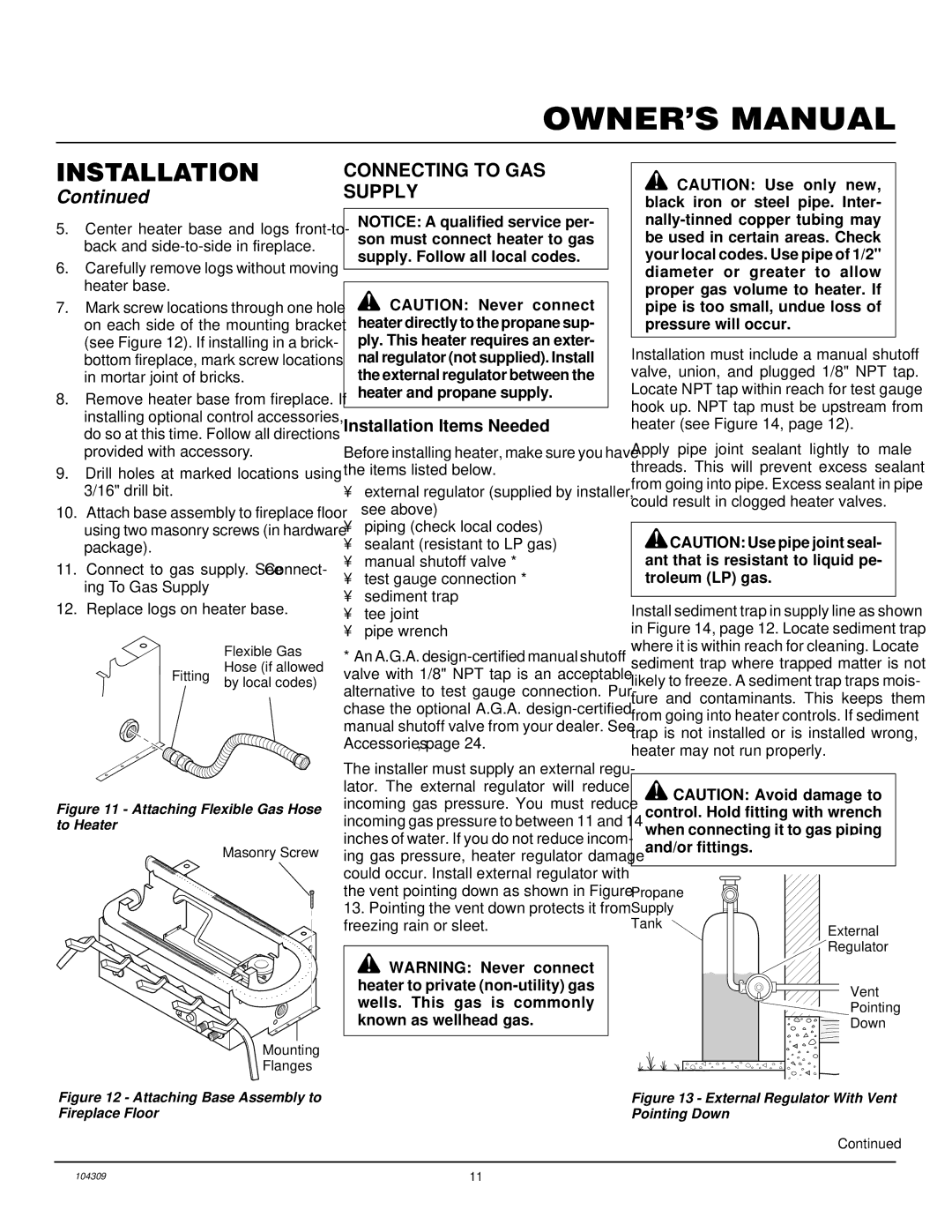
OWNER’S MANUAL
INSTALLATION
Continued
5.Center heater base and logs
6.Carefully remove logs without moving heater base.
7.Mark screw locations through one hole on each side of the mounting bracket (see Figure 12). If installing in a brick- bottom fireplace, mark screw locations in mortar joint of bricks.
8.Remove heater base from fireplace. If installing optional control accessories, do so at this time. Follow all directions provided with accessory.
9.Drill holes at marked locations using 3/16" drill bit.
10.Attach base assembly to fireplace floor using two masonry screws (in hardware package).
11.Connect to gas supply. See Connect- ing To Gas Supply.
12.Replace logs on heater base.
| Flexible Gas | |
Fitting | Hose (if allowed | |
by local codes) | ||
|
Figure 11 - Attaching Flexible Gas Hose to Heater
Masonry Screw
Mounting
Flanges
Figure 12 - Attaching Base Assembly to Fireplace Floor
CONNECTING TO GAS SUPPLY
NOTICE: A qualified service per- son must connect heater to gas supply. Follow all local codes.
![]() CAUTION: Never connect heater directly to the propane sup- ply. This heater requires an exter- nal regulator (not supplied). Install the external regulator between the heater and propane supply.
CAUTION: Never connect heater directly to the propane sup- ply. This heater requires an exter- nal regulator (not supplied). Install the external regulator between the heater and propane supply.
Installation Items Needed
Before installing heater, make sure you have the items listed below.
•external regulator (supplied by installer, see above)
•piping (check local codes)
•sealant (resistant to LP gas)
•manual shutoff valve *
•test gauge connection *
•sediment trap
•tee joint
•pipe wrench
*An A.G.A.
The installer must supply an external regu- lator. The external regulator will reduce incoming gas pressure. You must reduce incoming gas pressure to between 11 and 14 inches of water. If you do not reduce incom- ing gas pressure, heater regulator damage could occur. Install external regulator with the vent pointing down as shown in Figure
13.Pointing the vent down protects it from freezing rain or sleet.
![]() WARNING: Never connect heater to private
WARNING: Never connect heater to private
![]() CAUTION: Use only new, black iron or steel pipe. Inter-
CAUTION: Use only new, black iron or steel pipe. Inter-
Installation must include a manual shutoff valve, union, and plugged 1/8" NPT tap. Locate NPT tap within reach for test gauge hook up. NPT tap must be upstream from heater (see Figure 14, page 12).
Apply pipe joint sealant lightly to male threads. This will prevent excess sealant from going into pipe. Excess sealant in pipe could result in clogged heater valves.
![]() CAUTION: Use pipe joint seal- ant that is resistant to liquid pe- troleum (LP) gas.
CAUTION: Use pipe joint seal- ant that is resistant to liquid pe- troleum (LP) gas.
Install sediment trap in supply line as shown in Figure 14, page 12. Locate sediment trap where it is within reach for cleaning. Locate sediment trap where trapped matter is not likely to freeze. A sediment trap traps mois- ture and contaminants. This keeps them from going into heater controls. If sediment trap is not installed or is installed wrong, heater may not run properly.
![]() CAUTION: Avoid damage to control. Hold fitting with wrench when connecting it to gas piping and/or fittings.
CAUTION: Avoid damage to control. Hold fitting with wrench when connecting it to gas piping and/or fittings.
Propane |
|
Supply |
|
Tank | External |
| |
| Regulator |
| Vent |
| Pointing |
| Down |
Figure 13 - External Regulator With Vent Pointing Down
Continued
104309 | 11 |
